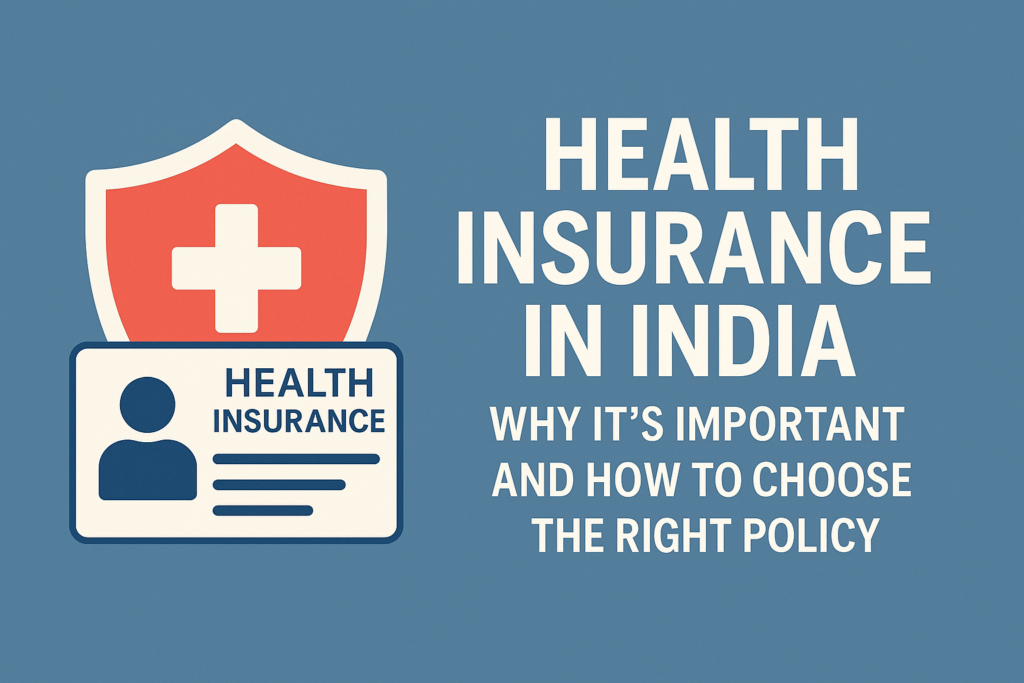

Health Insurance in India: Why It’s Important and How to Choose the Right Policy?
What is Medical Insurance? Importance, Who Should Buy & Key Points to Consider
In today’s world of rising medical costs and lifestyle-related diseases, medical insurance is no longer optional — it’s essential. A sudden hospitalization can drain your savings in days. That’s why understanding what health insurance is, why it is important, who should buy it, and what to look for while purchasing a policy is crucial for every individual and family.
In this detailed blog, we’ll simplify everything you need to know about medical insurance in India — written in a clear, beginner-friendly, and SEO-rich format.
Also Read;Top 9 Financial Ratios for Stock Market Investors: PE, ROE,
✅ What is Medical Insurance?
Medical Insurance, also known as Health Insurance, is a contract between you and an insurance company where the insurer agrees to cover your medical expenses in exchange for a premium. These expenses can include:
- Hospitalization costs
- Surgery and doctor fees
- Medicines and tests
- Daycare procedures
- Pre- and post-hospitalization charges
The insurance company either reimburses you or settles the bill directly with the hospital (cashless facility).
🏥 Why is Medical Insurance Important?
1. Protects Against Rising Healthcare Costs
Medical inflation in India is rising by 10–15% annually. A single hospitalization can cost anywhere from ₹50,000 to ₹10 lakh or more.
2. Prevents Financial Disruption
Health issues are unpredictable. Insurance protects your savings and ensures that health emergencies don’t turn into financial crises.
3. Cashless Treatment Facility
Most insurers offer a cashless network of hospitals where bills are directly settled without any hassle.
4. Covers Lifestyle Diseases
Policies today cover treatments for diabetes, hypertension, cancer, and other lifestyle illnesses that are on the rise.
5. Tax Benefits
You can claim tax deduction up to ₹25,000 (₹50,000 for senior citizens) under Section 80D of the Income Tax Act.
👪 Who Should Buy Medical Insurance?
Everyone. But here’s a more detailed breakdown:
- ✅ Young Individuals (20s–30s): Lower premium, better coverage, fewer exclusions.
- ✅ Families with Dependents: Family floater plans for spouse, kids, and parents.
- ✅ Senior Citizens: Special policies with wider health coverage.
- ✅ Employees with Employer Cover: Even if your company offers group insurance, buy a personal policy. Corporate covers are often limited and temporary.
- ✅ Self-Employed & Freelancers: No company cover, must buy their own.
🔍 Key Points to Consider While Buying Health Insurance in India
When choosing a medical insurance policy, consider the following:
1. Sum Insured (Coverage Amount)
Start with at least ₹5–10 lakh coverage. For metro cities, even higher is better due to costlier treatment.
2. Pre and Post-Hospitalization Cover
Choose a plan that covers expenses before and after hospitalization, ideally 30–60 days before and 60–90 days after.
3. Daycare Procedures
Ensure your policy covers modern treatments and daycare surgeries that don’t require 24-hour admission.
4. Room Rent Limits
Avoid policies with room rent capping (e.g., ₹2,000/day). It can restrict access to better hospital rooms and increase out-of-pocket expenses.
5. Network Hospitals
Choose insurers with a large cashless hospital network, especially in your area.
6. Waiting Periods
Most policies have a 2–4 year waiting period for pre-existing diseases. Opt for lower waiting period if possible.
7. Co-payment Clause
Check if the policy includes co-payment (a % you pay during claims). Ideally, go for zero or low co-pay.
8. No Claim Bonus (NCB)
Good policies offer increase in sum insured if no claim is made in a policy year.
9. Restore Benefit
Some plans offer automatic sum insured restoration if it’s used during a claim. Useful for multiple claims in a year.
10. Claim Settlement Ratio
Choose insurers with a high Claim Settlement Ratio (CSR) — typically above 95% is considered reliable.
Also Read;शून्य निवेश; बिजनेस आइडिया और निष्पादन रणनीति रणनीति
💰 Best Types of Health Insurance Policies in India; Health Insurance in India: Why It’s Important and How to Choose the Right Policy?
- Individual Health Insurance – For single insured members.
- Family Floater – Shared coverage for the whole family.
- Top-Up Plans – Add-on to existing plans for higher coverage at lower premium.
- Senior Citizen Plans – Designed for people above 60 years.
- Critical Illness Insurance – Covers life-threatening diseases like cancer, heart attack, etc.
- Maternity Cover – Includes childbirth and newborn expenses (usually with waiting period).
📌 Final Thoughts; Health Insurance in India: Why It’s Important and How to Choose the Right Policy?
Medical insurance is not a luxury — it’s a necessity. Whether you’re salaried, self-employed, young, or retired, the right health cover can be a financial lifesaver during medical emergencies. Don’t wait until it’s too late — buy early, buy smart, and stay insured.
📝 Frequently Asked Questions (FAQs) Health Insurance in India: Why It’s Important and How to Choose the Right Policy?
❓ Is health insurance mandatory in India?
No, it is not legally mandatory, but highly recommended.
❓ Can I claim tax benefit on medical insurance?
Yes, under Section 80D up to ₹25,000 (₹50,000 for senior citizens).
❓ Can I have multiple health insurance policies?
Yes, and you can claim from both as per IRDAI guidelines.
❓ Which is better: Individual or Family Floater?
Family floater is more economical for families. Individual plans offer fixed benefits per person.



